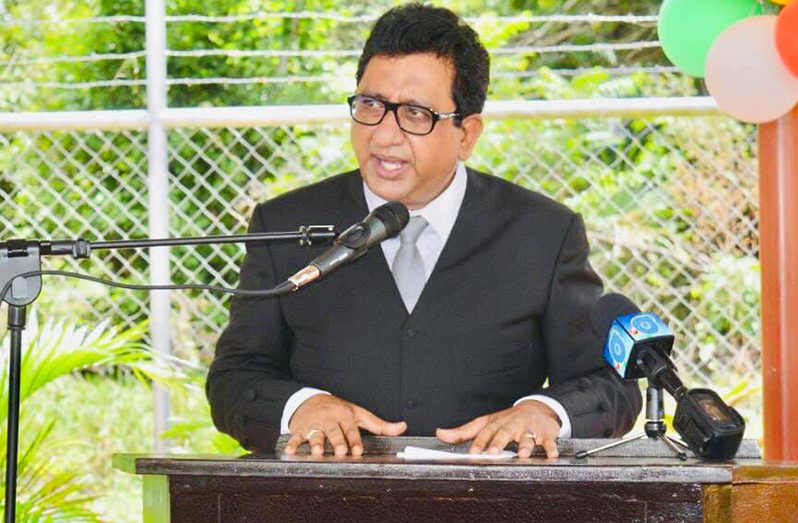-AG submits, cautions against repeating error made in Eslyn David case
Attorney General and Minister of Legal Affairs, Anil Nandlall, S.C, in his submissions to the Court of Appeal in the matter of Elections Petition, 99 of 2020, has reasoned that the court lacks jurisdiction to hear the matter, which was dismissed by the High Court, and cautioned that the Appeal Court should be wary of repeating the error made in the Eslyn David case.
On January 18, 2021, the Chief Justice (ag), Roxane George, S.C. ruled that the elections petition is invalid on the basis that the second named respondent, David Granger, was served the petition after the prescribed time for service had expired; the matter was subsequently appealed by attorney, Roysdale Forde, S.C., who is representing the petitioners.
In March last, Nandlall filed a Notice of Motion in the Court of Appeal seeking an Order to strike out the case on the basis that the court does not have jurisdiction to hear and determine the appeal, as the grounds for the appeal does not fall within the ambit of Article 163 of the Constitution.
In his submissions pertaining to the Notice of Motion seen by the Sunday Chronicle, Nandlall reiterated those contentions and cited a plethora of legal authorities to support his stance. He also cautioned that the error made in the case of Eslyn David must not be repeated, whereby the Court of Appeal assumed jurisdiction and which the Caribbean Court of Justice (CCJ) subsequently held it did not possess.
The Attorney-General reasoned that the Chief Justice, sitting in the High Court, striking out the petition on the basis of procedural impropriety for non-compliance with the strict electoral laws, led to the petition being dismissed without a determination on its merit and resulted in the court having no jurisdiction to hear and determine the issues in the petition.
He quoted the case of Christopher Ram vs the Attorney-General and Others [2019], where the CCJ had ruled that the court’s jurisdiction to hear and determine a petition is derived from the Constitution. In Guyana, Article 163 of the Constitution stipulates the law in those regards.
Nandlall explained that while Article 163 (3) creates a right of appeal in relation to elections petition matters, it circumscribes that right of appeal by mandating the grounds upon which such an appeal may be lodged.
Additionally, he noted that Article 163 (4) provides for Parliament to make provisions, which would govern the institution, conduct and consequences of the determination of any question permitted by the Article, to be determined by the court, as well as practice and procedures in relation to the jurisdiction, both in the High Court and in relation to appeals to the Court of Appeal.
He outlined that it is well known that Parliament made those provisions in the form of the National Assembly (Validity of Elections) Act and the National Assembly (Validity of Elections) Rules, which specifically state that the rules are enacted pursuant to Article 163, and a careful examination of the said legislation reveals no expressed provision in relation to appeals.
Nandlall also reminded the court that an appeal is not a common law right; he cited the case of Hing vs Hing (1978), in which it was held that “it is not irrelevant to recognise that a right of appeal is not one to which a litigant is entitled as a matter of natural justice. It is a statutory right exercisable, subject to compliance with the conditions prescribed by the statute or statutory instrument.
“The litigant who does not comply and so is unable to stand in this court and challenge the judgment of the court below, is not thereby deprived of a right to do so. What has happened is that he has not qualified to exercise the right and a legal bar arises as a result of such non-compliance.
“In the premises, it is clear that when the High Court’s exclusive jurisdiction conferred by Article 163 is activated and exercised, and a determination is made, appeals against such determination is exclusively governed and regulated by provisions contained in the said Article, as there is no other provision in relation thereto,” Nandlall submitted.
According to Nandlall, Article 163 (3) (b) which provides for the right of an appeal to the Court of Appeal does so “from the determination of the High Court of any such questions, or against any order of the High Court made in consequence of such determination.”
He submitted that “the determination of any such question” refers to the grounds which Article 163 already provides. He explained that since the case was struck out for procedural impropriety, which is the late service on Granger, consequently the court lacked jurisdiction to determine the questions raised in the petition and accordingly, did not do so.
“In the circumstances it is respectfully submitted that this Honourable Court lacks jurisdiction to entertain the instant appeal from the decision dismissing Election Petition No 99 of 2020, for procedural impropriety, as no such jurisdiction is provided for under the Constitution or any other law,” the AG submitted.
Additionally, Article 163 (3) deals with appeals from a decision of the High Court, determining certain questions provided for and contemplated by the said Article. It does not deal with the procedural method of appeal, and such matters, as the time frame for appealing or rules of the appeal, Nandlall argued.




.png)









